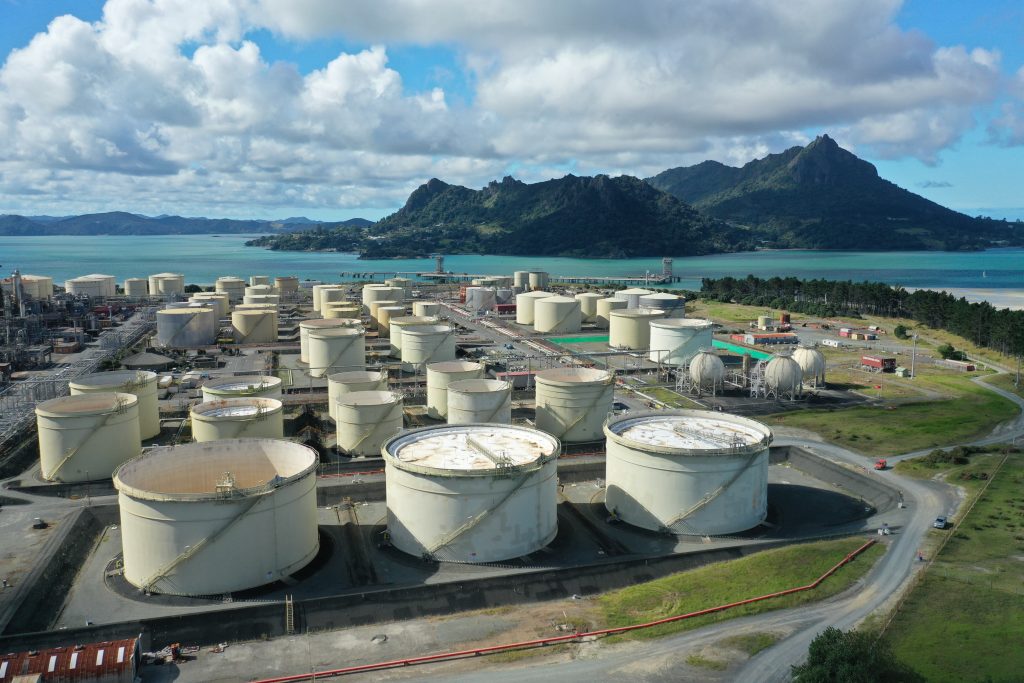Refining NZ Board confirms transition to import terminal, due to take place in April 2022
For immediate release
Refining NZ have today announced the Board have taken a final investment decision confirming the change in operations of their Marsden Point site. This means that Refining NZ will transition to an import-only fuel terminal, called Channel Infrastructure, from April 2022.
For immediate release
22 November 2021
Marsden Point
Refining NZ Board confirms transition to import terminal, due to take place in April 2022
Refining NZ have today announced the Board have taken a final investment decision confirming the change in operations of their Marsden Point site. This means that Refining NZ will transition to an import-only fuel terminal, called Channel Infrastructure, from April 2022.
The Board’s decision follows the signing of long-term terminal services agreements with all three of our customers (bp, Mobil, and Z Energy) on terms approved by shareholders in August.
CEO, Naomi James said:
“Today is a momentous day in the journey to transition our business away from operating as a refinery and to an import-only fuel terminal. After 60-years of operations as New Zealand’s only oil refinery, we now have certainty about our future, and as we look back on the past with pride, we also look to the future with confidence that our business will be able to continue to contribute to our community, and New Zealand, long into the future.”
Work is well advanced to prepare the Marsden Point site to operate as an import-terminal and to plan for the safe shutdown and decommissioning of the refinery. In recent weeks we have started the process of making appointments for the team who will be responsible for managing the transition, and decommissioning, as well as longer-term work with Channel Infrastructure.
CEO Naomi James added,
“I want to acknowledge the professionalism and dedication of our whole team over the past 18-months throughout the period of our strategic review, refinery simplification, and the past few months, over the latest lockdown. Our team quickly adapted to ensure that we were able to continue supplying New Zealand with fuel, safely and as planned.”
“Today’s announcement won’t impact most New Zealanders, however it will have a huge impact on our people, and our community, and we are implementing a range of transition support measures to assist those who will be moving on to other employment after we transition. This is a key focus for me personally, as I know that we have some of the best talent in the country working on our site, who will continue to play a critical role in the ongoing operation of our refinery over the next six-months. I am committed to supporting them through this time to find new jobs, or training opportunities – so they are ready to move to new jobs, when we become Channel Infrastructure, and we are working with other businesses to skills-match our people with their vacancies for the period after we transition.”
In addition, we have also agreed to provide dedicated private storage to customers. This is the first of several new growth opportunities we have identified for the future of Channel Infrastructure, and we look forward to providing further updates on other site repurposing opportunities in due course.
About Channel Infrastructure NZ
Channel Infrastructure’s vision is to be New Zealand’s leading independent fuel infrastructure company. The Company will utilise the deep-water harbour and jetty infrastructure at Marsden Point to import refined fuel, which is owned by its customers. This will replace the crude oil that our customers import today for refining.
Fuel will be stored at the Marsden Point site in existing tanks at the largest fuel terminal in New Zealand, with 180 million litres of shared capacity, as well as capacity to provide additional storage. Channel Infrastructure will continue quality fuel testing services both at the Marsden Point site and around New Zealand, through its IPL subsidiary.
Fuel from Marsden Point will be distributed on behalf of Channel Infrastructure’s customers primarily to the Auckland and Northland markets, which make up around 40% of New Zealand’s fuel demand, through the 170-kilometre Refinery to Auckland Pipeline (the RAP) and the truck loading facility (the TLF) located adjacent to the Marsden Point site.
Conversion to an import terminal will reduce the Company’s direct CO2 emissions by almost one million tonnes per annum, delivering around a third of the Government’s first Emissions Reduction Budget1. The RAP continues to provide the lowest carbon emissions option for delivering fuel to New Zealand’s largest market – Auckland.
Refining NZ has been the country’s only oil refinery since it was established in 1961. In response to a significant decline in refining margins as a result of excess refining capacity in the Asian region, Refining NZ initiated a strategic review of the business in April 2020, to determine the optimal future business model and capital structure for the Company’s future. This review included extensive engagement with a range of stakeholders including customers and the Government regarding potential options for ongoing refinery operations and the potential conversion to import terminal operations.
For more information on Channel Infrastructure, please visit: https://www.refiningnz.com/what-is-channel-infrastructure/
For businesses wanting to participate in Refining NZ’s skills-matching scheme, please contact
ENDS
1 Reference: Transitioning to a low-emissions and climate-resilient future: emissions reduction plan discussion document (https://environment.govt.nz/publications/emissions-reduction-plan-discussion-document/). The Company’s emissions are expected to reduce by c. 3.5MT over the 2022 -2025 budget period.
